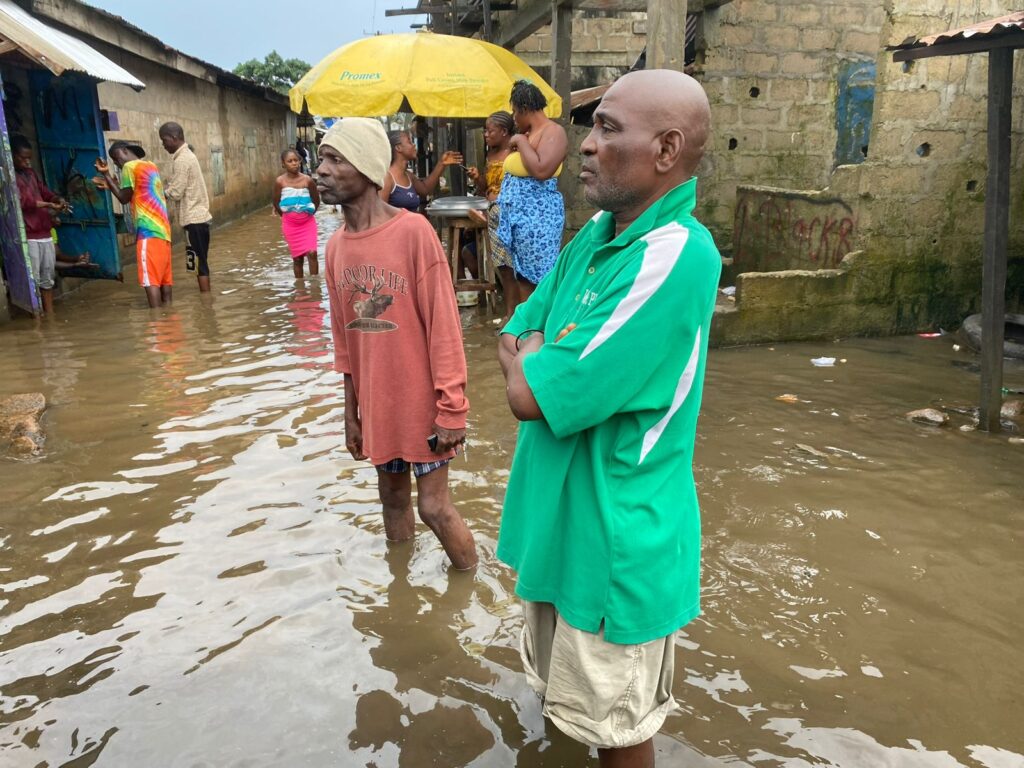On Wednesday, September 24, 2025, heavy rainfall caused severe flooding in parts of Monrovia, particularly in overcrowded slum areas such as Via Town, Doe Communities, and Clara Town. Homes were flooded with dirty, sewage-contaminated water, creating hazardous living conditions and posing serious health risks. For many residents, this flooding is a recurring nightmare.

Personal Stories of Loss and Disruption
The impact of the flood is deeply personal for residents, with women and children bearing the heaviest burden. A mother of four in Clara Town, who sells at the market, described her daily struggle: “Today I’m not able to go out and look for my living due to the flood this morning. I don’t know how I will manage with everything going on. Every time it rains heavily, water floods our home. I spend all day trying to pull water out.”
Children’s education has been severely disrupted. Twelve-year-old Aisha Conteh shared that she and many other children couldn’t attend school because campuses were flooded. Another mother, Mamie, explained, “We woke up this morning in water. Our children didn’t go to school today because the classrooms are filled with water too.”
The struggle is also felt by men and community leaders. Mohammed Kamara, a community leader in Doe Communities, said, “We do what we can to help families, but we can’t protect everyone from the seasonal flooding without proper drainage and support from the authorities. The water just destroys homes and livelihoods every time.”
Urgent Need for Systemic Solutions
The health risks from the floodwaters are severe, as they spread bacteria and chemicals, increasing the incidence of cholera, diarrhea, and skin infections. Women, as primary caregivers, are often forced to make difficult choices between ensuring family safety and their own survival.
A youth activist from Via Town, Marie Kamara, urged policymakers for action, stating, “This problem is serious. Every year it gets worse; we cannot keep facing the same floods. Communities need real solutions, not just promises. We need climate-resilient schools, clean drainage, and support for women who bear the brunt of these disasters.”
Experts and local advocates suggest that climate adaptation and mitigation measures are urgently needed. These include:
- Community-based flood early warning systems to alert residents before heavy rains.
- Upgraded drainage and sanitation infrastructure to prevent sewage contamination.
- Climate-resilient housing designs, such as raised foundations and water-resistant materials.
- Urban green spaces and retention ponds to absorb excess rainfall.
- Inclusive disaster preparedness training, prioritizing women, children, and other vulnerable groups.
A National Call to Action
The Natural Resource Women Platform (NRWP) documented the floods, capturing both the destruction and personal stories. NRWP emphasizes that while communities are resilient, repeated disasters require structural support, inclusive urban planning, and climate-sensitive policies.
Slum dwellers contribute minimally to greenhouse gas emissions but suffer disproportionately from the impacts of climate change. The flooding in Monrovia serves as a stark reminder that climate adaptation, mitigation, and gender-sensitive disaster response are crucial to protecting vulnerable populations.
As Sarah’s plea resonates with many, “We need the government and the world to see us. We cannot keep living like this every rainy season; this problem is serious.” This disaster is not just a local inconvenience; it is a national call to action for sustainable urban planning and stronger disaster response systems.
